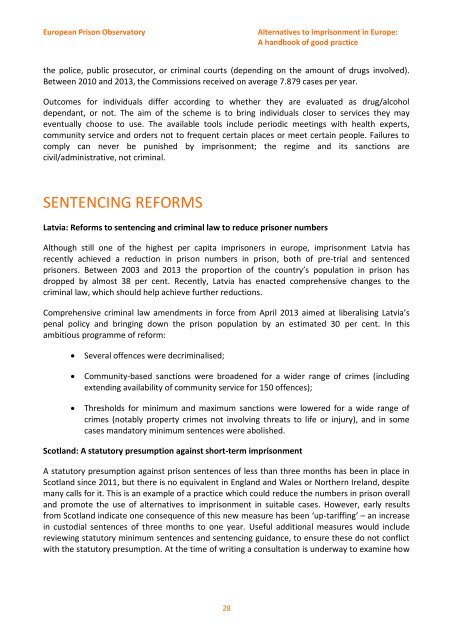good practice
Alternatives%20to%20imprisonment%20in%20Europe
Alternatives%20to%20imprisonment%20in%20Europe
You also want an ePaper? Increase the reach of your titles
YUMPU automatically turns print PDFs into web optimized ePapers that Google loves.
European Prison Observatory<br />
Alternatives to imprisonment in Europe:<br />
A handbook of <strong>good</strong> <strong>practice</strong><br />
the police, public prosecutor, or criminal courts (depending on the amount of drugs involved).<br />
Between 2010 and 2013, the Commissions received on average 7.879 cases per year.<br />
Outcomes for individuals differ according to whether they are evaluated as drug/alcohol<br />
dependant, or not. The aim of the scheme is to bring individuals closer to services they may<br />
eventually choose to use. The available tools include periodic meetings with health experts,<br />
community service and orders not to frequent certain places or meet certain people. Failures to<br />
comply can never be punished by imprisonment; the regime and its sanctions are<br />
civil/administrative, not criminal.<br />
SENTENCING REFORMS<br />
Latvia: Reforms to sentencing and criminal law to reduce prisoner numbers<br />
Although still one of the highest per capita imprisoners in europe, imprisonment Latvia has<br />
recently achieved a reduction in prison numbers in prison, both of pre-trial and sentenced<br />
prisoners. Between 2003 and 2013 the proportion of the country’s population in prison has<br />
dropped by almost 38 per cent. Recently, Latvia has enacted comprehensive changes to the<br />
criminal law, which should help achieve further reductions.<br />
Comprehensive criminal law amendments in force from April 2013 aimed at liberalising Latvia’s<br />
penal policy and bringing down the prison population by an estimated 30 per cent. In this<br />
ambitious programme of reform:<br />
<br />
<br />
<br />
Several offences were decriminalised;<br />
Community-based sanctions were broadened for a wider range of crimes (including<br />
extending availability of community service for 150 offences);<br />
Thresholds for minimum and maximum sanctions were lowered for a wide range of<br />
crimes (notably property crimes not involving threats to life or injury), and in some<br />
cases mandatory minimum sentences were abolished.<br />
Scotland: A statutory presumption against short-term imprisonment<br />
A statutory presumption against prison sentences of less than three months has been in place in<br />
Scotland since 2011, but there is no equivalent in England and Wales or Northern Ireland, despite<br />
many calls for it. This is an example of a <strong>practice</strong> which could reduce the numbers in prison overall<br />
and promote the use of alternatives to imprisonment in suitable cases. However, early results<br />
from Scotland indicate one consequence of this new measure has been ‘up-tariffing’ – an increase<br />
in custodial sentences of three months to one year. Useful additional measures would include<br />
reviewing statutory minimum sentences and sentencing guidance, to ensure these do not conflict<br />
with the statutory presumption. At the time of writing a consultation is underway to examine how<br />
28





